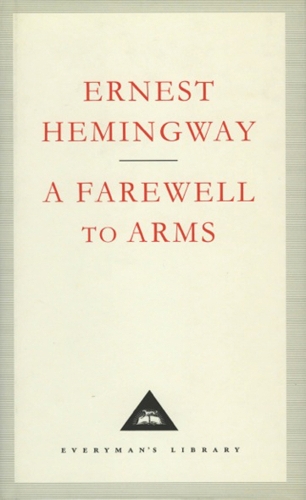
A Farewell To Arms
(Hardback)
Available Formats
Hardback
Published: 28th May 1993
Paperback
Published: 9th May 1997
Paperback
Published: 15th September 2022
Hardback
Published: 12th July 2016
Hardback
Published: 1st July 2025
Paperback
Published: 1st July 2025
Paperback
Published: 2nd December 2013
Publishing Details
A Farewell To Arms
By (Author) Ernest Hemingway
Everyman
Everyman's Library
28th May 1993
18th March 1993
United Kingdom
Classifications
General
Fiction
Modern and contemporary fiction: general and literary
813.52
Physical Properties
Hardback
320
Width 135mm, Height 213mm, Spine 30mm
520g
Description
One of Hemingway's finest novels, A FAREWELL TO ARMS was published in 1929 when the author was at the height of his power, It draws on his own experiences serving with the Italins in World War One when he was severely wounded in action and awarded the Croce de Guerra. This is a vivid portrait of men at war which also explores their deeper responses to the cruetly and heroism of Battle
Author Bio
Ernest Hemingway was born in 1899. His father was a doctor and he was the second of six children. Their home was at Oak Park, a Chicago suburb.
In 1917, Hemingway joined the Kansas City Star as a cub reporter. The following year, he volunteered as an ambulance driver on the Italian front, where he was badly wounded but decorated for his services. He returned to America in 1919, and married in 1921. In 1922, he reported on the Greco-Turkish war before resigning from journalism to devote himself to fiction. He settled in Paris where he renewed his earlier friendships with such fellow-American expatriates as Ezra Pound and Gertrude Stein. Their encouragement and criticism were to play a valuable part in the formation of his style.
Hemingway's first two published works were Three Stories and Ten Poems and In Our Time but it was the satirical novel, The Torrents of Spring, that established his name more widely. His international reputation was firmly secured by his next three books; Fiesta, Men Without Women and A Farewell to Arms.
He was passionately involved with bullfighting, big-game hunting and deep-sea fishing and his writing reflected this. He visited Spain during the Civil War and described his experiences in the bestseller, For Whom the Bell Tolls.
His direct and deceptively simple style of writing spawned generations of imitators but no equals. Recognition of his position in contemporary literature came in 1954 when he was awarded the Nobel Prize for Literature, following the publication of The Old Man and the Sea. He died in 1961.
